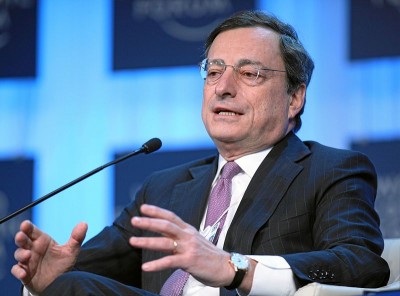Mario Draghi intervened verbally once again and does not hesitate to say anything. He said that the ECB is considering further non-standard monetary policy tools and will deploy them if circumstances warrant. He is also aware of the fact that the measures could have unintended consequences, but the ECB will be allegedly able to manage them appropriately. He also said that the banking union and supervision of the ECB over the main banks within the Eurozone could be one solution. But the banking union, according to some other sources, will not be able to operate earlier than at the end of 2014. An important point is that it cannot prevent any crisis, because problems within the banking sectors are not coming – they are already here. One of many examples could be the Deutsche Bank, which is allegedly horribly undercapitalized according to a top U.S. banking regulator Thomas Hoeing. The Deutsche Bank CEO said that everything is ok and that the bank had made enormous progress on its core tier-one capital ratio. He said that the DB is the one of the best capitalized banks in the world compared to its peers after capital raise of almost 5 billion euros. So, if this bank is one of the best capitalized compared to others, and at the same time it is true that it is actually undercapitalized, than what does the situation in other banks look like? And on Friday, European Union finance ministers were dealing with the set of rules for assigning losses when banks fail. The new rules should set standards for how to prop up or shut down failing banks, along with requirements for the kind of backstops each country must have in place. We will see what they will deliver to us.

European car sales fell to a 20-year low in May 2013. The most hit car makers were PSA Peugeot Citroen (UG), Renault SA (RNO) and Fiat SpA (F) – reading France and Italy. Registrations dropped 5.9 percent to 1.08 million vehicles from 1.15 million a year earlier. According to analysts, the EU market will shrink by 29 percent from the pre-crisis peak, and may stagnate at that level for quite a long time. The main reasons behind it are high youth unemployment and aging population, and of course financial uncertainty connected with the crisis.
As predicted, Cyprus economy is driven into a deeper recession, leading to a further rise in unemployment and making fiscal consolidation all the more difficult. Cyprus agreed on rules of rescue which will cause its long and painful death. According to some news, Cypriot president has begged for a revision of the bailout package and easing of strict rules. He wrote: “I urge you to review the possibilities in order to determine a viable prospect for Cyprus and its people.” We will hear about the country in the future for sure.
Some analysts have pointed to Japan as the next financial crisis trigger. But today it could happen anywhere; for example in China. It seems that counterparty mistrust among financial institutions reached extreme levels in China last week, where so called Shibor, or the Shanghai Interbank Offered Rate, has been surging. The rate is simply a barometer of liquidity on the Chinese credit markets. The situation was probably dangerous because the PBOC had to intervene to calm the markets and provide liquidity. Fitch also warns about China´s credit bubble and problems with its shadow banking system. “There is no transparency in the shadow banking system, and systemic risk is rising. We have no idea who the borrowers are, who the lenders are, and what the quality of assets is, and this undermines signaling,” said Charlene Chu from the Fitch.
It was the FED´s press conference that was the most monitored event of the last week. And what are the highlights of Bernanke’s press conference? Firstly, job gains and housing have increased consumer confidence. Secondly, most Fed members are not in favor of agency debt. Thirdly, monetary policy will continue to support the economic recovery. Fourthly, bond purchases may “moderate” later this year, and finally bond purchases could end around the middle of 2014. But the fact is that the Federal Open Market Committee left the monthly pace of bond purchases unchanged at $85 billion. The trick is that only the idea that the “drugs” will be taken away from the addicted economy suffices to generate a significant declining effect in almost all markets. No. No. There will not be an end of this policy.























